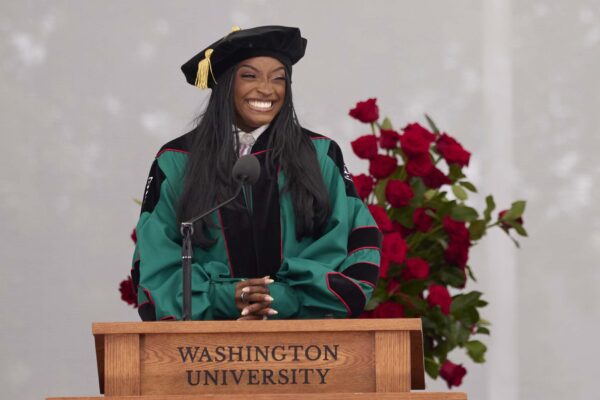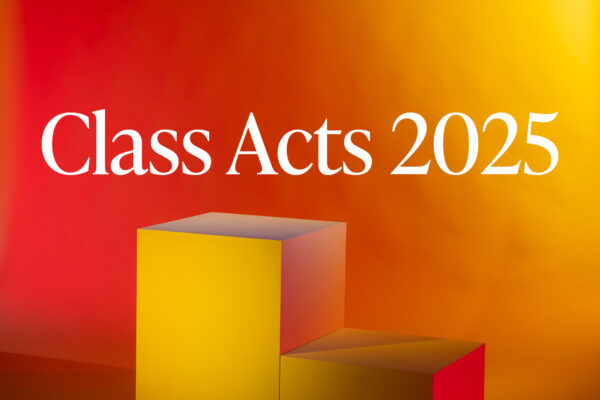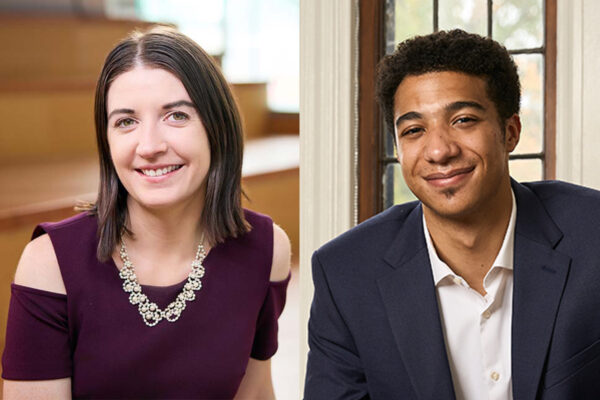Undergraduate student speaker Elijah Darden, who earned a degree in psychological and brain sciences from Arts & Sciences, delivered a message to the Class of 2025 at Washington University in St. Louis during the May 12 Commencement ceremony on Francis Olympic Field.
Below are Darden’s prepared remarks to the graduates.
Good morning my fellow graduates, families, faculty and staff. My name is Elijah Darden, and I am excited and grateful to speak to you today for such a tremendous moment. My fellow graduates, today is the culmination of not just the past years of our education but our entire lives up to this point. Now, admittedly, we have not been on the earth for that long. But when I look back, reflect, and try to understand the life we lived thus far, I can’t help but imagine it as a symphony. It makes sense. After all, I am a musician at heart.
But today, I would like all of you here to join me in my thought experiment of imagining your life as a symphony. Each movement depicting a different chapter of your existence through the resonance of an orchestra. Every instrument: an individual or inspiration. Each melody: a story of awe and joy; struggle and failure; perseverance and triumph. If our lives were these series of symphonic stanzas, what would this movement be? The one here at WashU that we, my fellow graduates, are reaching the end of now. What we musicians might call a coda. Perhaps it would have started with the fast-paced tempo of our fall welcome, dotted with accents and woodwind flourishes, as we found our place on the South 40. Or, a slow and lyrical waltz, as we discovered our communities, friendships and academic passions within WashU. Or maybe, a relentless and methodical march articulating the impacts we have left as a collective class on our campus and the greater St. Louis community.
That is how I would begin to compose our movement here. But just as every listener of a symphony will have a different interpretation of a piece, every single one of you has composed your own section in your symphony. Over the years, I have written pieces for small quintets all the way to symphony orchestras. From music composition, I have developed a unique set of skills, and one of these is finding order amongst the chaos: Confronting a jumbled mess of tangled and loose strings of noise, unraveling them, and weaving them into song. That is what I wish to do today. Take the rich complexities of our deeply intertwined lives and find the music that connects us all.
What I appreciate about music and composition is the endless variation in style, instruments, tempo and timbre. It is difficult to compare or equate a Beethoven symphony with a Count Basie jazz tune. A Kenny Rogers classic with Elton John. Or Kendrick Lamar’s ‘Not Like Us’ with Chappell Roan’s ‘Pink Pony Club.’ They are so distinct from one another. Just like each one of us. Coming from backgrounds and families locally, nationally, and internationally. We are rooted in our cultures, our lived experiences, our perspectives. This is what makes us unique and what drew us to the myriad of cultural affinity groups, club sports and all the other extracurriculars at WashU. These groups were essential for our souls. But we must acknowledge their warm comfort with room for understanding those who we do not yet surround ourselves with. Pushing our boundaries and engaging with beliefs, backgrounds and ideologies we do not share. Even if that means temporarily sacrificing our comfort. Each movement in our symphony is not performed in isolation. It requires every instrument to play their parts together.
Compositional innovation itself is born of the crossroads between music traditions. Jazz is a blend of music from global diasporas, constantly influencing each other. Without jazz and country, there would be no rock. Without jazz, funk and blues, we would never have had hip-hop. Without all of these genres and more, there would be no pop. And I think we can all agree the world would be a much sadder place without ‘Pink Pony Club.’ So, continue to engage with ideas that are seemingly unrelated or at odds with each other. Have those difficult conversations. Seek to understand the movements in each other’s symphonies because by understanding theirs, you will better understand your own.
Many moments of our time here at WashU have been dedicated to making our communities and the greater world a better place. You might think of this in the grandiose ways that many of you have made impacts. Engaging and leading in organizations and nonprofits that bring resources and care to our surrounding communities. Going door to door to encourage and promote information about voting. Establishing a Spanish-speaking CPR program. Spending countless hours volunteering at WashU and in St. Louis. But impact exists in small ways, as well. In my years as an emergency medical technician on this campus, I have been on well over 100 calls. In the majority of them, there has been a bystander: A concerned friend or fellow WashU community member, there, by the patient’s side. Supporting them in whatever they are going through. Small acts like those develop into bigger ones, as we establish ourselves a supportive foundation to build a better future.
But we cannot forget that even with our best intentions, we have, in our time here, made many mistakes. As my father told me as a child, ‘Just because you mean well, does not mean that you do well.’ In the metaphor of the symphonic movements of our life, we will find we composed dissonances we did not expect. Jarringly stumbled across syncopated rhythms. But as long as we reflect and learn to avoid intentional error, we can continue to strive to be better and move forward. Just as we ourselves will soon be graduates, continuing on to our future paths.
I would like to close with some remarks about purpose. Mark Twain said the most important days of your life are the day you are born and the day you find out why. I appreciate this quote, but I don’t think it captures the nuances of life. And while Mark Twain communicated through pen and paper, I find it best to return to my metaphor of music. The days that define us are only stanzas written in our music composition: something that cannot be erased but is only one part of a greater narrative. That the truths we believe about ourselves are strictly temporal, and the notes at the beginning of our composition influence but do not have to dictate how the rest will unfold. This can all be a frightening prospect. Your greatest triumphs may be followed by enormous failure. But your days of pain may also soon end, and a better future may lie ahead.
Sometimes, you don’t get to choose the verses written in your song, but many days we do. Fight to write your own symphony, to define the movements of your life with the morals, resilience, and passion that lie within you. The days when you uplift others will be inscribed to your musical stave, but so will the days in which you hurt others or bring them down. Be cognizant. Have integrity. But don’t forget, through all of it, to live life. Break away from the movements of your composition and have chapters of your life be poems. Fill the foreground of the paragraphs with music that accompanies your story.
Give pause and let the moments that could be written off with a few notes sprout into entire stanzas. Bring it all into your conscious perception. Now, I’m no Mark Twain, but with all of this in mind, I would like to hope that he would appreciate my slight addendum to his quote. That: the most important days of your life are the day you are born, and each and every day in which you look around, within, and rediscover why.
Thank you, and congratulations, my fellow graduates of the WashU Class of 2025.
Read Chancellor Andrew Martin’s message to the Class of 2025.
Read graduate student speaker Kendall Burks’ address.
Read Commencement speaker Simone Biles’ remarks here.



